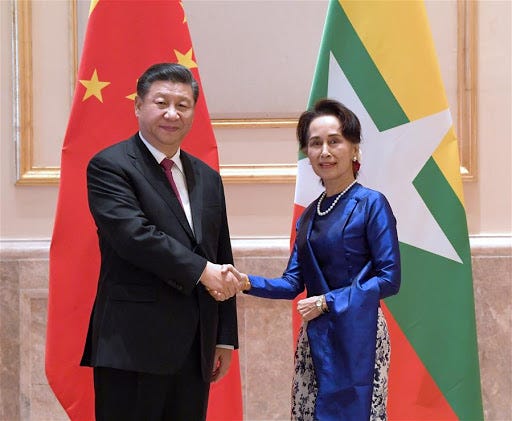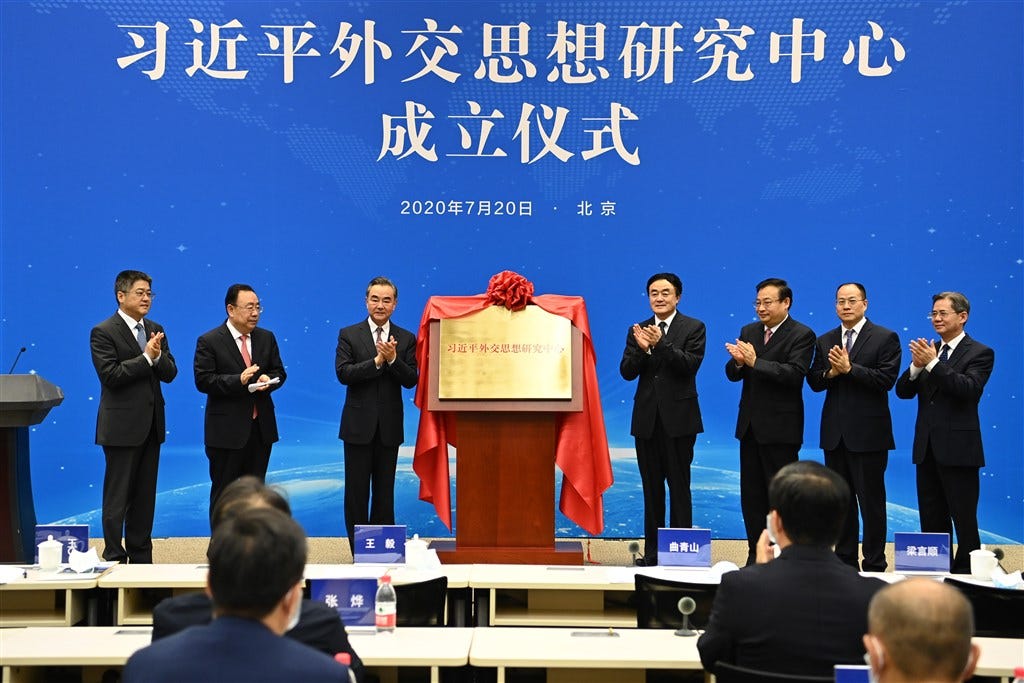Implementing Xi Jinping Thought on Diplomacy During COVID
I was delighted to contribute a chapter to the Center for Advanced China Research's (CACR) "Party Watch Annual Report," looking at how Chinese foreign policy evolved in and adapted to 2020
In 2020, the Chinese Communist Party’s (CCP) foreign policy apparatus navigated an unprecedented period by drawing on the Party’s unique culture and history as well as two relatively new concepts that inform how the CCP interprets and categorizes the theoretical construction and practical application of China’s foreign policy.
The CCP imposes an ideological framework on foreign policy work that informs how it perceives China’s relations with the world and dictates how it conducts diplomacy. This process is steeped in the Party’s unique culture and history which blends Marxist dogma, Leninist political structures, and the CCP’s self-described exceptionalism of “Chinese characteristics.”
The two relatively new concepts are central to China’s foreign policy discourse in 2020. Both inform our understanding of how the CCP sees the important work of managing its own development, and how it should interact with the outside world. The first concept is “profound changes unseen in a century” (百年未有之大变局), which informs how China interprets and categorizes the nature of international relations, and the second is “Xi Jinping Thought on Diplomacy” (习近平外交思想), which informs the theoretical construction of China’s foreign policy.
Phrases such as these, along with other oft-used slogans such as, “shared future for mankind,” are known as tifa (提法) or “formulations.” While they can be easily dismissed by outsiders as enigmatic or empty slogans, they are a critical part of the Marxist process of analyzing and responding to global conditions.
They are the foundation for Chinese foreign policy-making.
COVID-19, however, threw a wrench into the works of Chinese foreign policy-making. Xi Jinping was only able to travel to one country during the year and multilateral summits were forced online. Global opinion towards China took a turn for the worse, while diplomatic efforts to offset that trend were ineffective.
This chapter attempts to articulate the relevance of the two concepts and how they inform China’s diplomacy by drawing on several authoritative sources, including Xi Jinping’s remarks conveyed through official Party channels, and an enlightening speech by Foreign Minister Wang Yi at the opening of the Xi Jinping Thought on Diplomacy Research Center in July.
Intriguingly, Wang Yi described the underlying philosophy for China’s foreign policy, identifying Marxism as the organizing principle for great power relations (China’s relations with the U.S. and Russia) implying that these are hierarchical, competitive relationships based on a struggle for dominance, while Chinese culture forms the basis for China’s neighborhood diplomacy, informing the development of marquee programs such as the Silk Road Economic Belt and the 21st Century Maritime Silk Road.
At the end of the chapter, you can find a table of China’s virtual and in-person diplomatic engagements from January through September 2020.
You can read my chapter, available here:
You can read the entire annual report, available here:
I hope you enjoyed this post and email. I do not intend to send notices often, but I will occasionally highlight my more significant publications.
If you received this and do not know why, it is probably because we are connected in LinkedIn, or you handed me a card one day at a conference, back when we still had conferences and handed out cards. This is one way I hope we can remain in touch.
If you do not want to receive any future mailings, please feel free to unsubscribe using the link below. I will not be offended.




